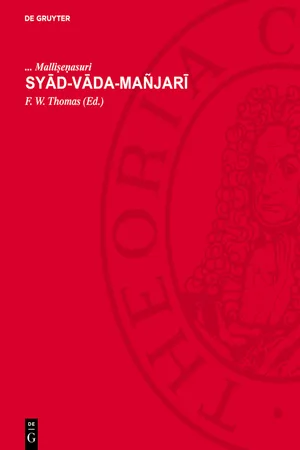
This is a test
- 176 pages
- English
- PDF
- Only available on web
eBook - PDF
Book details
Table of contents
Citations
About This Book
No detailed description available for "Sy?d-v?da-mañjar?".
Frequently asked questions
At the moment all of our mobile-responsive ePub books are available to download via the app. Most of our PDFs are also available to download and we're working on making the final remaining ones downloadable now. Learn more here.
Both plans give you full access to the library and all of Perlego’s features. The only differences are the price and subscription period: With the annual plan you’ll save around 30% compared to 12 months on the monthly plan.
We are an online textbook subscription service, where you can get access to an entire online library for less than the price of a single book per month. With over 1 million books across 1000+ topics, we’ve got you covered! Learn more here.
Look out for the read-aloud symbol on your next book to see if you can listen to it. The read-aloud tool reads text aloud for you, highlighting the text as it is being read. You can pause it, speed it up and slow it down. Learn more here.
Yes, you can access Syād-vāda-mañjarī by Malli?e?asuri, F. W. Thomas in PDF and/or ePUB format, as well as other popular books in Theology & Religion & Asian Religions. We have over one million books available in our catalogue for you to explore.
Information
Table of contents
- Prefatory Note
- Table of Contents
- Title page of the original work
- Preface
- I. The superior qualities of Śrī Vardhamāma, the last Tīrthamkara
- II. Śrī Vardhamāma has stated things as they really are
- III. Admonition to the reader
- IV. The Vaiśeşika doctrine of universality and particularity
- V. The Vaiśeşika doctrine of eternality and non-eternality
- VI. The Vaiśeşika doctrine of a world-creator God
- VII. The Vaiśeşika doctrine of 'Inherence'
- VIII. The categories of the Vaiśeşikas
- IX. The Vaiśeşika views about the size of the ātman
- X. Criticism of the Naiyāyikas
- XI. The Pūrva-mīmāmsā doctrine enjoining himsā
- XII. Kumārila’s theory of knowledge
- XIII. The Vedānta doctrine of Brahma as the sole reality
- XIV. The Vedānta theory of the denotation of terms
- XV. The Sāmkhya doctrines
- XVI. The Buddhist theory of cognition
- XVII. The Buddhist doctrine of Emptiness
- XVIII. The Buddhist doctrine of Momentariness
- XIX. The Buddttist doctrine of Suffusion
- XX. Criticism of the Lokāyatas
- XXI. The main metaphysical tenet of Jainism
- XXII. The Jain doctrine of the infinite complexity of all existents
- XXIII. The 'seven-nuance-view'.
- XXIV. The combination of opposites involves no contradiction
- XXV. The 'seven-nuance-view' applied to four philosophical problems
- XXVI. Neither eternality nor non-eternality can be maintained
- XXVII. The assumption of either eternality or non-eternality destructive of religion
- XXVIII. The Jain doctrine of the nayas (Methods)
- XXIX. The varieties of souls, and their number
- XXX. The doctrine of the Syādvāda, all-comprehensive and impartial
- XXXI. Praise of the Lord Mahāvīra
- XXXII. The Lord Mahāvīra is the only Saviour
- Benediction on the part of the author of the commentary
- Index of Terms and Subjects